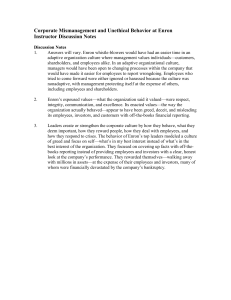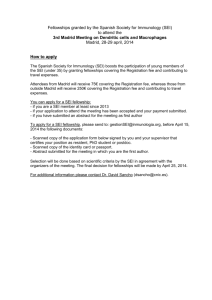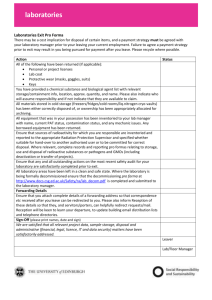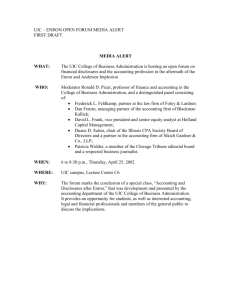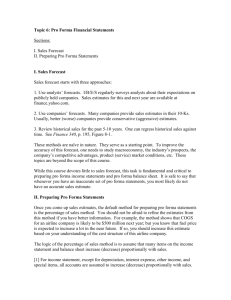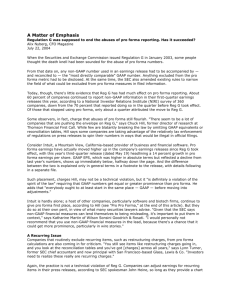Enron Fallout – The GAAP vs. Pro Forma Debate
advertisement
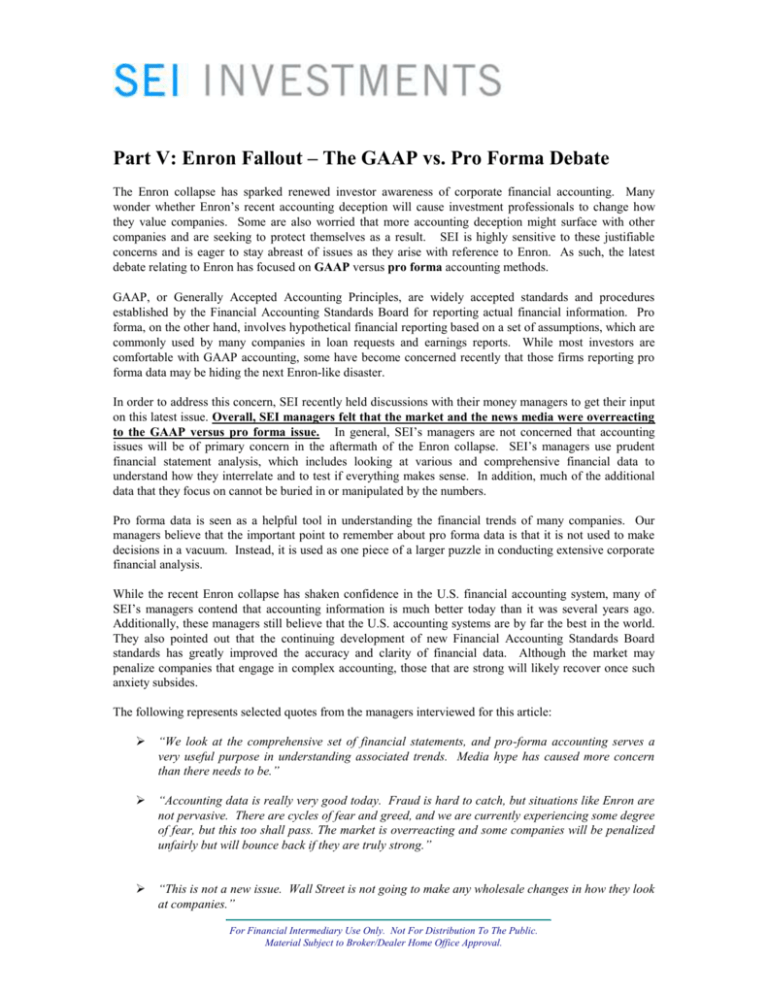
Part V: Enron Fallout – The GAAP vs. Pro Forma Debate The Enron collapse has sparked renewed investor awareness of corporate financial accounting. Many wonder whether Enron’s recent accounting deception will cause investment professionals to change how they value companies. Some are also worried that more accounting deception might surface with other companies and are seeking to protect themselves as a result. SEI is highly sensitive to these justifiable concerns and is eager to stay abreast of issues as they arise with reference to Enron. As such, the latest debate relating to Enron has focused on GAAP versus pro forma accounting methods. GAAP, or Generally Accepted Accounting Principles, are widely accepted standards and procedures established by the Financial Accounting Standards Board for reporting actual financial information. Pro forma, on the other hand, involves hypothetical financial reporting based on a set of assumptions, which are commonly used by many companies in loan requests and earnings reports. While most investors are comfortable with GAAP accounting, some have become concerned recently that those firms reporting pro forma data may be hiding the next Enron-like disaster. In order to address this concern, SEI recently held discussions with their money managers to get their input on this latest issue. Overall, SEI managers felt that the market and the news media were overreacting to the GAAP versus pro forma issue. In general, SEI’s managers are not concerned that accounting issues will be of primary concern in the aftermath of the Enron collapse. SEI’s managers use prudent financial statement analysis, which includes looking at various and comprehensive financial data to understand how they interrelate and to test if everything makes sense. In addition, much of the additional data that they focus on cannot be buried in or manipulated by the numbers. Pro forma data is seen as a helpful tool in understanding the financial trends of many companies. Our managers believe that the important point to remember about pro forma data is that it is not used to make decisions in a vacuum. Instead, it is used as one piece of a larger puzzle in conducting extensive corporate financial analysis. While the recent Enron collapse has shaken confidence in the U.S. financial accounting system, many of SEI’s managers contend that accounting information is much better today than it was several years ago. Additionally, these managers still believe that the U.S. accounting systems are by far the best in the world. They also pointed out that the continuing development of new Financial Accounting Standards Board standards has greatly improved the accuracy and clarity of financial data. Although the market may penalize companies that engage in complex accounting, those that are strong will likely recover once such anxiety subsides. The following represents selected quotes from the managers interviewed for this article: “We look at the comprehensive set of financial statements, and pro-forma accounting serves a very useful purpose in understanding associated trends. Media hype has caused more concern than there needs to be.” “Accounting data is really very good today. Fraud is hard to catch, but situations like Enron are not pervasive. There are cycles of fear and greed, and we are currently experiencing some degree of fear, but this too shall pass. The market is overreacting and some companies will be penalized unfairly but will bounce back if they are truly strong.” “This is not a new issue. Wall Street is not going to make any wholesale changes in how they look at companies.” For Financial Intermediary Use Only. Not For Distribution To The Public. Material Subject to Broker/Dealer Home Office Approval. “Events like this have occurred before and tend to pop up during market bottoms.” “In regards to problem companies, we are more likely in the 7 th inning as opposed to the 2nd inning.” Looking forward, SEI’s managers believe that there will be pressure for accounting firms to no longer conduct consulting work for their audit clients in an attempt to curtail accounts from being switched between firms. If anything, this would be a positive change, as it would prevent any biased behavior. They also contend that some short-term volatility is also likely due to market anxiety. SEI’s managers believe that we will not see a meaningful number of additional issues being raised. They also maintain that the Street is now completely focused on the accounting issue and that other problem companies should be revealed regardless of any wholesale changes in accounting regulations. The Enron situation is very visible due to the size and the magnitude of the fraud. This was not an occurrence borne by complicated accounting alone. These recent events have raised understandable concern among the investment community, and SEI is committed to addressing these issues in a timely fashion. We will continue to closely monitor Enron-associated events as they develop. The following managers were interviewed for this piece: Equinox Capital Management Peregrine Capital Management Alliance Capital Management Duncan-Hurst Capital Management Iridian Asset Management Disclosure Manager comments are as of February 21, 2002. This material represents the manager’s assessment of the markets environment at a specific point in time and should not be relied upon by the reader as research or investment advice regarding any stock. For Financial Intermediary Use Only. Not For Distribution To The Public. Material Subject to Broker/Dealer Home Office Approval.
